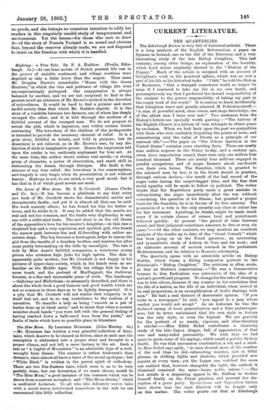Highrigg : a True Tale. By P. A. Haddow. (Foulis,
Edin- burgh. 6s.)—At one time novels of Scotch peasant life ran in the ,groove of amiable sentiment, and village worthies were depicted as only a little lower than the angels. Then came Mr. Douglas Brown's remarkable "House with the Green Shutters," in which the vice and pettiness of village life were uncompromisingly portrayed. One exaggeration is always balanced by another, and we are not surprised to find in the present novel an extension of Mr. Brown's method in the direction of uuloveliness. It would be hard' to find a grimier and more sordid society than that which Mr. Haddow depicts. It is the story of a vendetta between two farmers, one of whom has deeply wronged the other, and it is told through the medium of a faithful servant of the wronged man. We do not propose to reveal the plot, which is ingenious, and within certain limits• convincing. The love-story of the children of the protagonists is intended to provide the necessary element of relief. It is a grim story, faithful in details, and bold in purpose; but its dreariness is not relieved, as in Mr. Brown's case, by any dis- tinction of style or imaginative power. Hence the impression left upon the reader is too uniformly unpleasant for true art. At the same time, the author shows certain real merits,—a strong grasp of character, a power of observation, and much skill in elaborating his drama through dialogue. His fault is the absence of any true relief : the love-story is too commonplace, and tragedy is only tragic when its presentation is not without beauty. Highrigg is not, to our mind, a very good novel : but it has that in it of which good novels are mado.






















































 Previous page
Previous page